|
| |

|
B
- My
books/videos related to
JFK Life |
1
2
3
4 5
6
| Books
151 - 200 |
|
My twelve years
with John F.Kennedy |
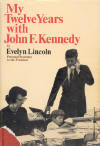 |
Lincoln Evelyn
1965 |
Intimate insights into the life and character of JFK are presented in this
book by the person who in many ways knew him best. For twelve years Evelyn
Lincoln was President Kennedy's personal secretary. Her desk was just
outside his office door; she shared the journeys, the campaigning, the
years in the Senate and his all-too-short Presidency. |
|
Non chiederti
cosa il tuo Paese può fare per te, chiediti cosa puoi fare tu per il tuo
Paese |
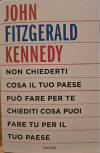 |
John F. Kennedy
2013 |
The pages of this book (in Italian),
published on the fiftieth anniversary of the assassination, collect the
most important speeches given by the President during his mandate,
starting with the famous inauguration speech that gives the book its
title.
These words represent a hymn to the construction of a more supportive
society and have been a source of inspiration for several generations of
citizens thanks to their deep emotional charge and their visionary
strength.
An extraordinary orator, John Fitzgerald Kennedy is still today the ideal
point of reference for all those who believe that a different and more
just world is possible and necessary. |
Once Upon a Secret
[My affair with
President John F.Kennedy and its aftermath] |
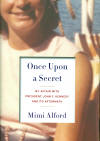 |
Alford Mimi
2012 |
In the summer of 1962, nineteen-year-old Mimi Beardsley arrived by train
in Washington D.C. to begin an internship in the White House press office.
The Kennedy Administration had reinvigorated the capital and the country -
and Mimi was eager to contribute.
For a young woman from a privileged but sheltered upbringing, the job was
the chance of a lifetime. Although she started as a lowly intern, Mimi
made an impression on Kennedy's inner circle and, after just three days at
the White House, she was presented to the President Kennedy. Almost
immediately the two began an affair that would continue for the next
eighteen months.
In 2003, a Kennedy biographer mentioned "a tall, slender, beautiful
nineteen-year-old college sophomore and White House intern, who worked in
the press office" in reference to one of the President's affairs.
The disclosure set off a tabloid frenzy and soon exposed Mimi and the
secret taht she had kept for forty-one years. Because her past had been
revealed in such a shocking, public way, she was forced, for the first
time, to examine the choices she'd made. She came to understand that
shutting down one part of her life so completely had closed her off from
so much more.
No longer defined by silence or shame, mimi Alford has finally unburdened
herself with this searingly honest account of her life and her extremely
private moments with a very public man.
"One Upon a Secret" offers a new and personal depiction of one of our most
iconic leaders and a powerful, moving story of a woman coming to terms
with her past and moving out of the shadows to reclaim the truth. |
|
One Minute to
Midnight |
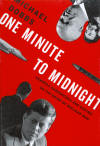 |
Dibbs Michael
2008 |
In October 1962, at the height of the Cold War, the United States and the
Soviet Union appeared to be sliding inexorably toward a nuclear conflict
over the placement of missiles in Cuba. Veteran Washington Post reporter
Michael Dobbs has pored over previously untapped American, Soviet and
Cuban sources to produce the most authorative book yet on the Cuban
missile crisis. |
|
Portrait of
Camelot: A Thousand Days in the Kennedy White House
(includes DVD) |
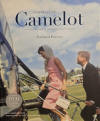
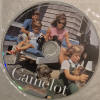 |
Richard Reeves
1995 |
Published to
commemorate the 50th anniversary of John F. Kennedy’s election as
president of the United States, this book is a revealing and intimate
portrait of a leader, husband, and father as seen through the lens of
Cecil Stoughton, the first official White House photographer. Stoughton’s
close rapport with the president and first lady gave him extraordinary
access to the Oval Office, the Kennedys’ private quarters and homes, to
state dinners, cabinet meetings, diplomatic trips, and family holidays.
Drawing on Stoughton’s unparalleled body of photographs, most rarely or
never before reproduced, and supported by a deeply thoughtful narrative by
political historian Richard Reeves, Portrait of Camelot is an
unprecedented portrayal of the power, politics, and warmly personal
aspects of Camelot’s 1,036 days.
DVD INCLUDED: packaged with a DVD created exclusively for this book,
containing color and black-and-white film footage Stoughton created of the
Kennedy family in the White House, in Hyannis Port, and on holidays. |
|
Prelude to
Leadership |
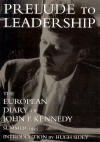 |
John F.Kennedy
1995 |
The European Diary of John
F.Kennedy - Summer 1945.
As World WarII was ending and the cold war was just
beginning, a twenty-eight-year-old naval hero, decommissioned before war's
end because of his injuries, traveled through a devastated Europe. During
that trip, John F.Kennedy kept a diary. As the diary makes clear, that
European trip was a turning point in the future President's life. |
|
President Kennedy
- Profile of Power |
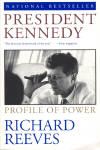 |
Reeves Richard
1993 |
This book is the compelling, dramatic history of JFK's thousand days in
office. It illuminates the presidential center of power by providing an
in-depth look at the day-by-day decisions and dilemmas of the thirty-fifth
president as he faced everything from the threat of nuclear war abroad to
racial unrest at home. |
|
Primary |
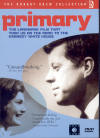 |
Drew Robert
DVD |
The landmark film that took us on the road to the Kennedy White House.
"A new kind of reporting, a new form of history" Robert Drew promised John
F.Kennedy. He was proposing that a revolutionary, small camera operated by
cameramen Ricky Leacock and sync sound recorder operated by himself, live
with Kennedy day and night for nearly a week during the climax of his 1960
Wisconsin presidential primary run against Hubert Humphrey. The
resulting film, Primary, turned out to be a cinematic experience
unique in the history of film, the first in the development of American
cinema veritè, and a template for ground-breaking films Drew would later
shoot in the Kennedy White House. |
|
Profiles in
Courage |
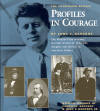 |
John F.Kennedy
1955 |
JFK wrote this book while recovering from a back injury in 1955, and it
went on to win the Pulitzer Prize for History in 1956.
John F.Kennedy chose to write about 8 United States
Senators- men who were the very models of virtue and integrity under
intense pressure :-John Quincy Adams; -Daniel Webster; -Thomas Hart
Benton; -Sam Houston; -Edmund G.Ross; Lucius Quintus Cincinnatus Lamar;
-George Norris; -Robert Taft. |
|
PT109 - John
F.Kennedy in WW II |
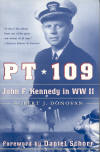 |
Donovan Robert J.
2001 |
First published to wide critical acclaim in
1961, this timeless classic tells the complete story of PT 109 and her
crew. Journalist Robert Donovan interviewed the men involved in the
sinking of PT 109 and the rescue of it crew to get his story, including
all ten survivors- President Kennedy among them. |
|
Quotations of
John F.Kennedy |
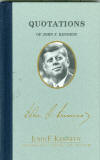 |
John F.Kennedy
2008 |
Small book, published from JFK Presidential
Library and Museum, with several quotations of John F.Kennedy. |
Raise the Dead: Nixon vs Kennedy
[The
complete Transcripts] |
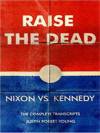 |
Young Justin Robert
2019 |
“This is the story of two elections, both of them unlike anything
else—except each other.”
The invention of new media, conspiracies of fraud, rogue politicians
bucking the system.
The election of Donald Trump in 2016 shocked the nation, but in 1960, John
F. Kennedy won the presidency with the exact same playbook. The precedents
set and tactics invented in that historic election are still in use to
this day.
If 1960 is so important, why don’t you know more about it?Book
now!
Raise The Dead is a 6-part podcast series on the 1960 election and
its stunning parallels to 2016.
This ebook is the full transcripts from all 6 episodes including a bonus
episode about the Chicago mob and Frank Sinatra |
|
Religious Views
of President John F.Kennedy |
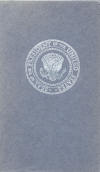 |
Rev. Schneider Nicholas A.
1965 |
The collection of the religious thought of
President Kennedy is divided in five sections : Remarks and Addresses,
Proclamations ad Communiqués, Answers to Questions proposed at News
Conferences, Excerpts, and an Appendix containing some proclamations not
found in the Public Papers.
Most of the items were addressed to audiences gathered for religious
purposes or representing religious groups, or to commemorate religious
observations. |
|
Remembering Jack |
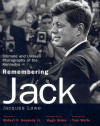 |
Lowe Jacques
2003 |
Jacques Lowe's photographs of the Kennedys,
taken during his tenure as JFK's personal photographer, have become the
iconic imagery of a time that remains vividly etched in the national
psyche. Upon Lowe's death, commentators credited his picture with creating
the myth of Camelot.
Of Lowe's forty thousand Kennedy's photographs, only a few hundred
have ever been seen, and all of his negatives, which were housed in a
vault in the World Trade Center, were destroyed on Sept.11,2001. For this
definitive book, fine reproductions have been created from existing prints
and contact sheets - in some cases of images he never even printed. This
book features more than 600 pictures, half of which are previously
unpublished. |
Report of the County Chairman
[Personal story
of the Presidential election campaign 1960] |
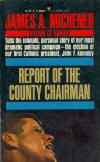 |
Michener James A.
1961 |
James A.Michener, famous novelist, author of
"Haway", "The Bridge at Andau" and "Sayonara", tells the intimate,
personal story of most dramatic American political campaign - the election
of the first catholic president, John F.Kennedy.
It reads as a novel, holds you breathless with suspense as Michener tells
you how he and his friends worked, struggled, cried, prayed and cheered
for John F. Kennedy. |
Rescuing JFK
[How Solomon
Islanders rescued John F.Kennedy and the Crew of PT-109] |
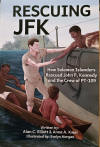 |
Alan C.Elliott & Anna A. Kwai
2022 |
Rescuing JFK is the story of the PT-109's
dramatic rescue in World War II - told from the perspective of the two
Solomon Islands Scouts who saved the crew. In this story, future president
John F. Kennedy's boat (PT-109) is rammed by a Japanese destroyer and sunk
during World War II. Two young Solomon Islanders, Scouts for the
Australian Royal Navy's Coastwatchers, rescue the crew in a daring
adventure that shaped Kennedy's (and America's) future. The heroic deeds
of Biuku Gasa, Aaron Kumana had a long-lasting effect on American history. |
|
Ritratti del
Coraggio |
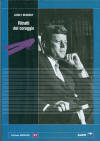 |
John F.Kennedy
2008 |
Italian Version of the book "Profiles in Courage", with introduction
written by Caroline Kennedy.
JFK wrote this book while recovering from a back injury in 1955, and it
went on to win the Pulitzer Prize for History in 1956.
John F.Kennedy chose to write about 8 United States
Senators- men who were the very models of virtue and integrity under
intense pressure :-John Quincy Adams; -Daniel Webster; -Thomas Hart
Benton; -Sam Houston; -Edmund G.Ross; Lucius Quintus Cincinnatus Lamar;
-George Norris; -Robert Taft. |
Selling Outer
Space
[Kennedy, the
Media and Funding for Project Apollo, 1961-1963] |
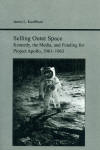 |
Kauffman James L.
1994 |
"Kauffman's compelling book....examines how the Kennedy Administration and
the media constructed the space program in ways designed to win
congressional and public approval.
Kauffman analyzes the construction of the space program as a series of
rethorical moves, raising questions not only about the media, government,
and technology but also about how we understand public life"
Journal
of American History |
|
State of the
Union Addresses of John F.Kennedy
|
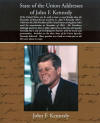 |
John F.Kennedy
1964 |
These are the three State of the Union Speeches Kennedy delivered :
- January 30, 1961
- January 11, 1962
- January 14, 1963 |
|
Strategia di Pace
|
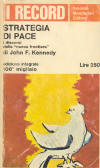
 |
John F.Kennedy
1960 |
Italian Version.
Collection of all JFK's speeches, when he was still a US Senator. |
|
The Best Year of
Their Lives: Kennedy, Johnson and Nixon in 1948 |
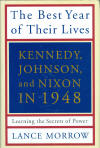 |
Morrow Lance
2005 |
In 1948, John Kennedy, Lyndon Johnson and Richard Nixon were ambitious
young congressmen in postwar Washington, all of them at a crucial turning
point in their personal lives and public careers. Their future
presidencies would dominate American public life from 1961 to 1974 and
define one of the country's most turbulent eras. In this tightly-framed
portrait, journalist Lance Morrow explores the passions, ambitions and
demons that drove these men, and reflexts on the shadow they cast on
American culture and memory. |
|
The Burden and
The Glory |
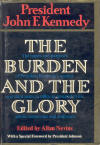 |
Kennedy John Fitzgerald
(edited by Allan Nevins)
1964 |
The Hopes and Purposes of President Kennedy's second and third years in
office as revealed in his public statements and addresses |
The Bystander
[John F.Kennedy and the
struggle for Black Equality] |
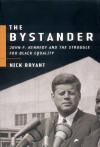 |
Bryant Nick
2006 |
In this book, the first comprehensive history of Kennedy's civil rights
record over the course of his entire political career, Nick Bryant shows
that Kennedy's shrewd handling of the race issue in his early
congressional campaigns blinded him as president to the intractability of
the simmering racial crisis in America. By focusing on mainly symbolic
gestures, Kennedy missed crucial opportunities to confront the
obstructionist Southern bloc and to enact genuine reform. |
|
The Dark Side of
Camelot |
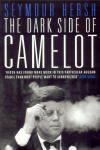 |
Hersh Seymour
1997 |
In this groundbreaking book, award-winning investigative journalist
Seymour Hersh shows us a John F.Kennedy we have never seen before, a man
insulated from the normal consequences of behaviour long before he entered
the White House. His father, Joe, set the pattern with an arrogance and
cunning that have never been fully appreciated: Kennedys could do exactly
what they wanted, and could evade any charge brought against them.
Kennedys wrote their moral code. |
|
The Election of
1960 and the Administration of JFK |
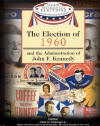 |
Schlesinger Arthur M. Jr.
2003 |
The event that played the greatest role in
the 1960 presidential election was the growth of television during the
preceding decade. The developing medium allowed voters to know more about
the candidates - the incumbent Republican Vice President Richard Nixon and
Democratic senator John F.Kennedy - than in any previous election. This
book discusses the famous presidential debates, each party's advertising
campaigns and the other elements that made 1960 a key election year in
American political history. |
The First Modern
Campaign
[Kennedy, Nixon and the Election of 1960] |
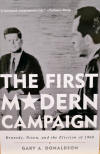 |
Gary A. Donaldson
2007 |
The presidential campaign
that pitted Richard M. Nixon against John F. Kennedy was the most
significant political campaign since World War II. With Eisenhower's
tenure at an end, American society broke with the culture of the war
years. This social shift was reflected in and provoked by new trends in
American political life and political campaigning, all of which made 1960
a landmark year in American politics.
In this engaging book, Gary A. Donaldson tells the story of Kennedy versus
Nixon with a sharp eye for the salient political developments and a keen
sense of the drama of an election that was unlike any other the nation had
experienced. The election of 1960 was also an orchestrated political
drama, organized as a sweeping campaign from coast to coast and staged for
a national television audience. This made it the first modern campaign in
which the television media changed the dynamics of presidential politics
and in which photographs, charisma, and direct appeals to voters counted
as they had never done before. It was also an election of intense personal
rivalry made all the more spirited by the prejudice against Kennedy's
Catholicism and his intention to widen the American political arena. |
The Fourteenth
Day
[JFK and the Aftermath of the Cuban Missile Crisis] |
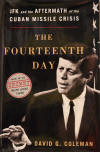 |
David G.Coleman
2012 |
A fly-on-the-wall
narrative of the Oval Office in the wake of the Cuban Missile Crisis,
using JFK’s secret White House tapes.
On October 28, 1962, Soviet Premier Nikita Khrushchev agreed to remove
nuclear missiles from Cuba. Popular history has marked that day as the end
of the Cuban Missile Crisis, a seminal moment in American history. As
President Kennedy’s secretly recorded White House tapes now reveal, the
reality was not so simple. Nuclear missiles were still in Cuba, as were
nuclear bombers, short-range missiles, and thousands of Soviet troops.
From October 29, Kennedy had to walk a very fine line―push hard enough to
get as much nuclear weaponry out of Cuba as possible, yet avoid forcing
the volatile Khrushchev into a combative stance. On the domestic front, an
election loomed and the press was bristling at White House “news
management.” Using new material from the tapes, historian David G. Coleman
puts readers in the Oval Office during one of the most highly charged, and
in the end most highly regarded, moments in American history. 20
photographs |
|
The Greatest
Speeches of President JF Kennedy |
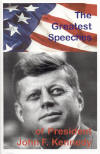 |
edited by
Dudley Brian R.
1995 |
Included are these renowned speeches :
- "We stand today on the edge of a New Frontier"
- "Ask not what your country can do for you..."
- "We seek peace-but we shall not surrender"
- "We choose to go to the moon"
- "An already clear and present dander"
- "Let us...step back from the shadow of war"
- "We face a moral crisis as a country and as a people" |
|
The Humor of JFK |
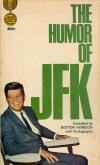 |
compiled by
Booton Herndon
1964 |
The astonishing thing about the natural humor
of John F.Kennedy was that it proved to be, again and again, a thing of
delight to friend and adversary alike.
It was impossible to resist the magnetism of his comic spirit, or not to
be charmed by his polished cajolery.
The most persuasive of his humorous pleasantries are collected in these
pages. |
The Irish Brotherhood
[John F.Kennedy, His Inner
Circle and the Improbable Rise to the Precidency] |
|
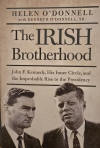 |
Helen O'Donnel
with Kenneth O'Donnel Sr
2015 |
The Irish Brotherhood is the history of Jack Kennedy's original political
inner circle. Led by Bobby Kennedy, Kenny O'Donnell, Larry O'Brien, and
Dave Powers they were tough minded, Irish–Catholic guys who were joined
together by a common ambition to see Jack Kennedy through to the White
House. War veterans who were young, ambitious, and they wanted their
country back. Jack Kennedy was their man, their leader. No matter that he
was Irish, Catholic, and his "Old Man" had made as many enemies as
friends—Jack had ambition, brains, a special charisma. To win the White
House would be a victory not only for Jack Kennedy, but for the
downtrodden. They collectively decided that if the political powers would
not let them in willingly then they would kick the door down. At the
center of the story is Kenny O'Donnell, Jack Kennedy's tough talking,
no–bullshit, top political aide. Jack recognized he needed Kenny's blue
collar, political genius and Kenny recognized something special in Jack.
The Irish Brotherhood describes what it was like to be inside the Kennedy
inner circle. With Bobby, who was determined to make his own mark apart
from his famous family, his life–long struggle, never won, never lost.
With Joe, as Kenny and Larry prove to him that their outsider approach was
going to work after Jack's crushing victory in '58, which sets the stage
for the Presidential campaign to come. This book is a missing piece of the
story of the improbable rise to power of John F. Kennedy and further fills
out the picture of the man revealing that Jack Kennedy was at heart a
politician. He enjoyed the rough and tumble and despite his personal
issues, or perhaps because of them, he became determined to succeed beyond
anybody's expectations. It is intriguing an indelible portrait of the son,
brother, friend, Congressman, Senator and President.
|
|
The JFK Portraits |
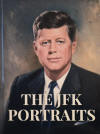 |
AA.VV.
2024 |
Collection of portraits of John F. Kennedy, 35th President of the United
States. |
The Kennedy
Baby
[The loss that
transformed JFK] |
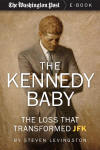 |
Levingston Steven
2013
E-book |
A
sensitive portrait of how a profound tragedy changed one of America’s most
prominent families.
Their marriage is the subject of countless books. His presidency has been
pored over minute by minute by historians. They lived their lives in the
public eye and under a microscope that magnified all of their flaws, all
of their scandals, all of their tragedies. Now Steven Levingston,
nonfiction editor at the Washington Post, presents a devastating story in
unprecedented detail, about a child John and Jackie Kennedy loved and
lost.
On August 7, 1963, heavily pregnant Jackie Kennedy collapsed, marking the
beginning of a harrowing day and a half. The doctors and family went into
full emergency mode, including a helicopter ride to a hospital, a scramble
by the President to join her from the White House, and a C-section to
deliver a baby boy, Patrick Bouvier Kennedy, five and a half weeks early
with a severe respiratory ailment. The baby was so frail he was
immediately baptized.
Over the next thirty nine hours the nation watched and waited. The vigil
was spread across the front pages of the newspapers; the country watched
the life of Patrick unfold on the evening news. Within the Kennedy family,
the drama was transforming the president and his marriage. Both he and
Jackie, long known for their cool exteriors, were brought together by a
shared sadness and love as they never had been. Although baby Patrick
succumbed after 39 hours, his father was born anew through the tragedy.
THE KENNEDY BABY is a vivid drama of a national tragedy and private trauma
for the Kennedy family, taking readers through the lead up to the birth,
the ordeal in the hospital, and JFK’s personal growth through his hardship
and the progress toward a changed marriage – a breakthrough all the more
acute in light of the tragedy that loomed only months away.
|
|
The Kennedy
Mystique - Creating Camelot |
 |
Goodman Jon
2006 |
This book combines arresting photography and perceptive analysis to tell
the whole story of the love affair between the Kennedys and the camera, a
far more complex and sophisticated relationship than we might suppose.
Camelot insiders and media experts like Jackie's social secretary Letitia
Baldrige, White House correspondent Hugh Sidey, historian Robert Dallek
and Life magazine photo editor Barbara Baker Burrows provide rare
perspective on 150 remarkable images- as historical records, as publicity,
and as symbols. |
The Kennedy
Obsession
[The American
Myth of JFK] |
 |
John Hellmann
1997 |
John F. Kennedy was not only a president, but also a symbol for America's
most cherished ideas. In The Kennedy Obsession, John Hellmann takes a
thoroughly original approach to understanding Kennedy's star power and his
carefully crafted public image. Tracing Kennedy's self-creation as
diligent scholar, bashful hero, and sensitive rebel-cued by cultural
figures such as Lord Byron, Ernest Hemingway, and Cary Grant-and the
images of Kennedy in the aftermath of his assassination, Hellmann reveals
the painstaking transformation of private life into public persona, of a
man into perhaps the major American myth of our time. |
|
The Kennedy
Reader |
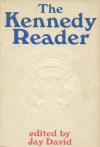 |
edited by
David Jay
1967 |
Here is a collection of some of the best and best known writing in
existence by and about John Fitzgerald Kennedy. |
|
The Kennedy Tapes |
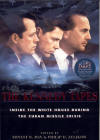 |
May Ernest R. & Zelikow Philip D.
1997 |
Inside the White House during the Cuban Missile Crisis.
Oct.62 : the United States and the Soviet Union stood face
to face, each brandishing enough nuclear weapons to obliterate the other's
civilizations. For two weeks an executive committee, formed around
elements of President Kennedy's National Security Council, debated what to
do, twice coming to the brink of attacking Soviet military units in Cuba.
Through it all, audio tape was rolling. These are the full, authenticated,
transcripts of those recordings. |
|
The
Kennedy-Khrushchev Letters |
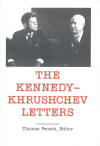 |
Fensch Thomas
(editor)
2001 |
In the early 1960s, Nikita Khrushchev initiated a correspondence with John
Kennedy in an effort to bridge gaps between the two leaders and between
U.S.S.R. and the U.S.A.
The two leaders exchanged letters from 1960 until John Kennedy's
assassination in 1963; these letters were kept Top Secret until almost the
year 2000.
This volume contains 120 letters between John Kennedy and Nikita
Khrushchev and they should be an invaluable aid toward understanding the
years of the Kennedy administration and the Khrushchev regime.
|
|
The Kennedys and
Cuba |
|
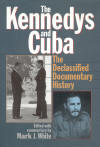 |
White Mark J.
1999 |
The Declassified Documentary History.
In this intriguing assemblage of documents, drawn from the State
Department, the Kennedy Libray, private papers, and the Assassination
Records Review Board, and including newly released materials, Mark White
traces the attitude and actions of the Kennedys in their fateful dealings
with Castro and Cuba. |
|
The Letters of
John F. Kennedy |
|
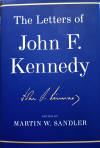 |
edited by Martin
W. Sandler
2013 |
John Fitzgerald Kennedy led his nation for little more than a thousand
days, yet his presidency is intensely remembered, not merely as a
byproduct of his tragic fate. Kennedy steered the nation away from the
brink of nuclear war, initiated the first nuclear test ban treaty, created
the Peace Corps, and launched America on its mission to the moon and
beyond. JFK inspired a nation, particularly the massive generation of baby
boomers, injecting hope and revitalizing faith in the American project.
Martin Sandler's The Letters of John F. Kennedy stands out as the only
book that draws on letters from and to Kennedy, as collected at the
Kennedy Presidential Library and Museum. Drawn from more than two million
letters on file at the library--many never before published--this project
presents readers with a portrait of both Kennedy the politician and
Kennedy the man, as well as the times he lived in.
Letters to and from the likes of Martin Luther King Jr, Clare Booth Luce,
Pearl Buck, John Wayne, Albert Schweitzer, Linus Pauling, Willy Brandt,
Eleanor Roosevelt, Nikita Khruschev, Harry Truman, Herbert Hoover, a young
John Kerry, and Ngo Dinh Diem are complemented by letters from ordinary
citizens, schoolchildren, and concerned Americans. Each letter will be
accompanied by lively and informative contextualization. Facsimiles of
many letters will appear, along with photographs and other visual ephemera
from the Kennedy Library and Museum. |
The Making of a Catholic President
[Kennedy vs Nixon 1960] |
|
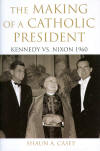 |
Casey Shaun A.
2009 |
The 1960 Presidential election, ultimately won by John F.Kennedy, was one
of the closest and most contentious in American history. The country had
never elected a Roman Catholic president, and the last time a Catholic had
been nominated - New York Governor Al Smith in 1928 - he was routed in the
general election. From the outset, Kennedy saw the religion issue as the
single most important obstacle on his road to the White House. In this
book, Shaun Casey tells the fascinating story of how the Kennedy campaign
transformed the "religion question" from a liability into an asset, making
him the first (and still only) Catholic president. |
|
The Making of the
President 1960 |
|
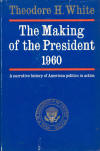 |
White Theodore H..
1961 |
More than a year before the election of John
F.Kennedy, Theodore H.White began to explore the secret planning and
private aspirations of seven men, each of whom, in his own way, found his
dreams tormented by the power that might be his in the White House. By
spring, Mr White had begun to follow the open candidates as they plodded
through the snows and early jousting of the primaries. Continuing through
the conventions, the campaigns and the final drama of election night, he
fashioned a work of contemporary history that highlights the decisions,
the acts, the accidents, that created an American President, and also the
cold political realities of a country upon whose decision the world of
freedom waited. |
|
The Memories -
JFK 1961-1963 |
|
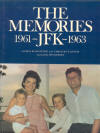 |
Stoughton Cecil & Clifton
Chester V.
1973 |
In 1961 President John Kennedy's friend and Military Aide, General Chester
V.(Ted) Clifton assigned Captain Cecil Stoughton of the Army Signal Corps
to the full-time job of keeping a photographic record of President
Kennedy's days in the White House. Captain Stoughton had extraordinary
opportunities to photograph, to remember JFK as President, as father, as
husband, as a great human being in moments of crisis and tension, of joy
and relaxation. |
|
The Pleasure of his
company |
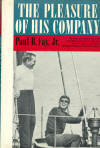 |
Fay Paul B. Jr
1966 |
Paul B.Fay Jr and John Kennedy served together as PT Boat officers both in
training and action. After the war the two men were associated as friends
and campaigners. In 1961 Red Fay was appointed Under Secretary of the Navy
and served until 1965.
In this book, Fay delivers just what the title promises : the marvelous
fun of being with JFK in his least formal, most unguarded moments. |
|
The Presidential
Portfolio - JFK |
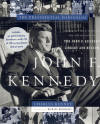 |
Kenney Charles
2000 |
This book features more than 250 photos and documents from the JFK
Presidential Library and Museum that capture the essence, style, and
excitement of the Kennedy presidency.
It includes an extraordinary 60-minute audio CD of JFK on the phone and at
work. |
|
The President's team
(The 1963 Army-Navy game
and the assassination of JFK) |
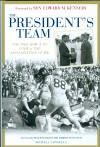 |
Connelly Michael
2009 |
The Naval Academy football team of 1963 was branded a "team of destiny" by
its coach, Wayne Hardin. With Heisman Trophy winner Roger Staubach at
quarterback and a talented group of athletes on both side of the ball, the
Midshipmen indeed seemed destined for greatness that season. After winning
8 of their first 9 games, the Midshipmen were scheduled to head to
Philadelphia in late November for the annual Army-Navy game, the highlight
of any season for both service academies.
Although as Commander in chief of all the armed services President Kennedy
was expected to be impartial in the contests between the military
academies, it was clear where the former PT109 Lieutenant placed his
allegiances.
Kennedy's firsthand relationship with Midshipmen footballers dated back to
1960, when as president-elect he met with Heisman winner Joe Bellino and
the other stars of the fourth-ranked Midshipmen. Six weeks later, Bellino
and 3,500 other members of the Naval Academy Brigade led the march in
President Kennedy's inauguration parade.
Over the next several years, the president remained a keen follower of the
strong navy team.
Then, the tragic events of November 22,1963 readjusted the priorities of
every American citizen. The assassination of a beloved president left the
nation shocked and saddened. The 44 men of the Navy football team, both as
athletes and as men dedicated to serving their country, took the
news particularly hard but decided to dedicate the rest of their season to
the fallen president. |
|
The Real Making of the President
(Kennedy, Nixon and the
1960 Election) |
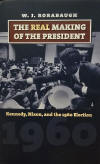 |
W.J. Rorabaugh
2009 |
War hero, champion of labor, and Pulitzer Prize-winning author, JFK was
long on charisma. Despite a less than liberal record, he assumed the image
of liberal hero—thanks to White and other journalists who were shamelessly
manipulated by the Kennedy campaign. Rorabaugh instead paints JFK as the
ideological twin of Nixon and his equal as a bare-knuckled politician,
showing that Kennedy's hard-won, razor-thin victory was attributable less
to charisma than to an enormous amount of money, an effective campaign
organization, and television image-making.
The 1960 election, Rorabaugh argues, reflects the transition from the
dominance of old-style boss and convention politics to the growing
significance of primaries, race, and especially TV—without which Kennedy
would have been neither nominated nor elected. He recounts how JFK
cultivated delegates to the 1960 Democratic convention; quietly wooed the
still-important party bosses; and used a large personal organization,
polls, and TV advertising to win primaries. JFK's master stroke, however,
was choosing as a running mate Lyndon Johnson, whose campaigning in the
South carried enough southern states to win the election.
On the other side, Rorabaugh draws on Nixon's often-ignored files to take
a close look at his dysfunctional campaign, which reflected the oddities
of a dark and brooding candidate trapped into defending the Eisenhower
administration. Yet the widely detested Nixon won almost as many votes as
the charismatic Kennedy, even though Democrats outnumbered Republicans by
three to two. This leads Rorabaugh to reexamine the darker side of the
election: the Republicans' charges of vote fraud in Illinois and Texas,
the use of money to prod or intimidate, manipulation of the media, and the
bulldozing of opponents. |
|
The remarkable
Kennedys |
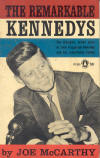 |
McCarthy Joe
1960 |
This book was written in 1960, before the election of JFK to President, by
Joe McCarthy, a former war correspondent and a top reporter and writer of
non-fiction. It is the story of John Kennedy - his early life in a
close-knit, ambitious family, his initiation into a political career he
never wanted, and his rapid- some say too rapid- rise to national fame. |
|
The Road to Camelot
(Inside JFK's
Five-Year Campaign) |
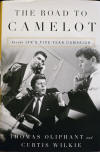 |
Thomas
Oliphant & Curtis Wilkie
2017 |
A behind-the-scenes, revelatory account of John F. Kennedy’s wily campaign
to the White House, beginning with his bold, failed attempt to win the
vice presidential nomination in 1956. A young and undistinguished junior
plots his way to the presidency and changes the way we nominate and elect
presidents.
John F. Kennedy and his young warriors invented modern presidential
politics. They turned over accepted wisdom that his Catholicism was a
barrier to winning an election and plotted a successful course to that
constituency. They hired Louis Harris—a polling entrepreneur—to become the
first presidential pollster. They twisted arms and they charmed. They
lined up party bosses, young enthusiasts, and fellow Catholics and turned
the traditional party inside out. The last-minute invitation to Lyndon B.
Johnson for vice president in 1956 surprised them only because they had
failed to notice that he wanted it. They invented The Missile Gap in the
Cold War and out-glamoured Richard Nixon in the TV debates.
Now acclaimed, award-winning journalists Tom Oliphant and Curtis Wilkie
provide the most comprehensive account, based on a depth of personal
reporting, interviews, and archives. The authors have examined more than
1,600 oral histories at the John F. Kennedy library; they’ve interviewed
surviving sources, including JFK’s sister Jean Smith, and they draw on
their own interviews with insiders including Ted Sorensen and Arthur
Schlesinger, Jr.
From the start of the campaign in 1955 when his father tried to persuade
President Johnson to run with JFK as his running mate, The Road to Camelot
reveals him as a tough, shrewd political strategist who kept his eye on
the prize. This is one of the great campaign stories of all time,
appropriate for today’s political climate. |
|
The search for
Kennedy's PT109 |
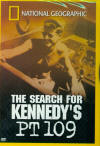 |
National Geographic
DVD
|
In this DVD you can embark on a search for
the truth about one of the most legendary war stories of the 20th century!
Set sail with Dr Robert Ballard, discoverer of the Titanic, as he attempts
to locate John Kennedy's sunken torpedo boat, PT109.
Through re-creations, archival footage, eye-witness accounts, and memories
of Kennedy family members, you will relive Kennedy's heroic efforts to
save his crew after their collision with a Japanese destroyer. And, amid
the suspense of Ballard's voyage, you will discover how the harrowing
adventure of a young Navy lieutenant helped transform JFK into the future
leader of his country. |
|
The speeches of John
F.Kennedy |
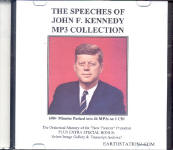 |
CD-Rom
Mp3 collection
|
Great tribute to the oratorical mastery of
the "New Frontier" President, with 46 MP3 audio speeches, commencing from
the beginning of JFK's Presidential Campaign to his tragic assassination,
plus 96 speech transcripts archive, spanning JFK's career from campaign to
Presidency, and 42 image photo gallery, featuring JFK, his family and the
White House. |
1
2
3
4 5
6
Back to Top Back to Biagio's
Kennedy Home Page


Biagio Privitera's
Home Page. You can contact me at
biagio@biagioprivitera.it
|
![]()